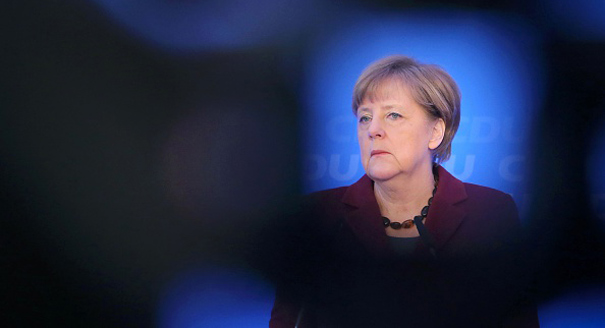Angela Merkel has survived several crises in the past. But her open-door policy toward the refugees fleeing the wars in Syria, Iraq, and Afghanistan has proved to be the biggest challenge to her leadership since she became German chancellor in 2005.
The challenge is so big that Merkel is losing support from her Christian Democratic Union (CDU), while its Bavarian sister party, the Christian Social Union, has repeatedly asked Merkel to impose a cap on the number of refugees entering Germany.
Some 40 conservative parliamentarians recently wrote to Merkel demanding a change of policy. And during an acrimonious meeting of the CDU’s parliamentary group, a senior party figure told Merkel’s critics to “shut up.” Rarely has Merkel had to face such internal opposition, having been adept for so long at keeping dissent at bay. But her critics are no longer prepared to remain silent.
Merkel has refused to introduce any limits, even though some 3,000 refugees and migrants keep entering the country per day, mainly into Bavaria from Austria. Germany has already taken in 1.1 million people over the past twelve months amid immense support from volunteers and civil society movements that have sprung up to help struggling local councils.
But the sexual assaults on women in Cologne, Hamburg, Düsseldorf, and other cities during New Year’s Eve celebrations—mostly by North Africans, according to the police—are dampening that enthusiasm. The German interior and justice ministries have begun seeking ways to deport people to Tunisia and Morocco, as these countries are deemed safe. But these states are unwilling to cooperate with Berlin.
Germany is also stepping up the deportation of people from Western Balkan countries, from where thousands of economic migrants have entered Germany in recent months. The EU’s plan for Turkey to tighten its borders and allow refugees to work in that country has, so far, produced few results. None of the above measures is silencing Merkel’s critics.
Closer to home, Werner Faymann, the Austrian chancellor, decided on January 20 to reinforce border controls and set a limit on the number of refugees entering the country. “If there is not an all-European solution, countries such as Austria are obliged to take national measures,” said Sebastian Kurz, the Austrian foreign minister.
Sigmar Gabriel, the leader of Germany’s Social Democratic Party and the country’s economy minister, told delegates at the World Economic Forum in Davos that Austria’s decision was a “cry for help” from Europe. Serbia also said it would close its borders if the refugees could enter Austria or Germany.
The borders of Europe are closing. But #Germany is holding out. Why?Tweet This
In short, the borders of Europe are closing. But Germany is holding out. Why?
Apart from a deep moral belief in assisting the refugees, Merkel’s fear—and that of her finance minister, Wolfgang Schäuble—is that if Berlin shut its borders, such a move would precipitate the end of the euro and the end of the EU’s single market. This, they believe, is what is at stake for Germany and Europe.
Yet no matter how often Merkel has sought support from her EU allies and warned them of the consequences of closing the bloc’s internal borders, such support has not been forthcoming. Most EU countries, even those that have had open-door policies toward refugees, such as Sweden, have battened down the hatches. Increasingly, Merkel is isolated. Her options become more limited by the day.
Merkel has pleaded for more time, as she has done in the past. The EU will hold a summit in mid-February to discuss yet again the refugee crisis, which the EU has proved incapable of dealing with. European solidarity and the legal commitment to helping refugees have all but disappeared.
Merkel told a meeting of Christian Social Union officials in Bavaria on January 20 that she would be presenting new proposals at the summit. “Then we can draw an interim conclusion, then another interim conclusion, and then we will see where we stand,” she said. Those words will hardly reassure her party or her coalition partners, the Social Democrats. They are becoming increasingly nervous as the coalition faces three big regional elections this coming March. For the first time, this will show the extent of public support for Merkel’s policies.
Meanwhile, Mark Rutte, the prime minister of the Netherlands, which currently chairs the EU’s ministerial council meetings, said “we have to think about a plan B” for the refugee crisis.
Merkel has never spoken about any plan B. To do so would be to renege on her commitment to welcome refugees and to maintain the Schengen system of open borders. And it would vindicate all those other governments, particularly in Central Europe, that have literally closed their doors to refugees by building fences along their borders.
If #Merkel has a plan B for #refugees, there's no sign of it so far.Tweet This
Joachim Gauck, the German president, who, like Merkel, grew up in Communist East Germany and who has spoken about the moral and political necessity of helping the refugees, is beginning to modify his stance. Speaking in Davos, Gauck said a policy of limiting the flow of refugees was morally and politically acceptable to give the state and local authorities time to cope. “Restrictions are not per se unethical,” he said. “Restrictions help to support acceptance. But without acceptance a society is not open and receptive.”
Merkel hasn’t yet reached that point. Or if she and Schäuble do have a plan B, there’s no sign of it so far.






.jpg)